
December 27
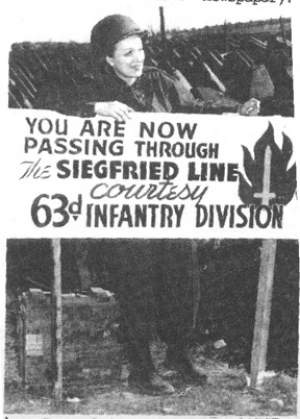
1901 Birth: Marlene Dietrich: film actress and cabaret singer from Berlin who became a Hollywood star after starring in Josef von Sternberg's film "The Blue Angel" (1930). The film featured "Falling in Love Again (I Can't Help It"), a signature song she performed internationally until the 1970s. All angles and androgyny, she's been a sex symbol and fashion icon since she appeared in German films in the 1920s. As an actress she is best known for her roles in the von Sternberg movies "Shanghai Express" (1932), "Blonde Venus" (1932) and "The Scarlet Empress" (1934). In Hollywood her best-known roles were in the western comedy "Destry Rides Again" (1939, featuring her other well-known song, "The Boys in the Back Room"), the courtroom drama "Witness for the Prosecution" (1957) and the Orson Welles thriller "Touch of Evil" (1958). As a singer she was known for cabaret songs sung in a deep, sultry voice, for her support of U.S. troops during World War II and for her popularity in the 1950s in London and Las Vegas. She broke her leg during a performance in 1975 and stopped appearing publicly, spending her remaining years as a recluse in her Paris apartment.
1918 Various:
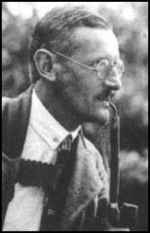
Volkishness: Eberhard von Brockhusen writes a letter to General Heimerdinger asking to be relieved of his office as Grand Master of the loyalist Germanenorden. (THP)
Poles take up arms against German troops in Poznan:
In the wake of the German defeat, members of the People's Guard, the Polish military organization, joined by a number of volunteers—many of them veterans of the Great War—take up arms against the occupying German army in the major industrial city of Poznan.
At the beginning of World War I, close to three-quarters of Poland was under the control of Russia; the remainder of the country was ruled by Germany and Austria-Hungary. The start of war between Russia and the Central Powers, then, saw Poles fighting for both sides. With the downfall of the Russian Empire in March 1917, the Bolsheviks recognized Russian-held Poland's right to autonomy, and a provisional government was established in Paris. By later that year, however, Germany was in complete control of the country.
After the defeat of the Central Powers, the road to Polish statehood seemed to be clearing. A Polish republic was declared soon after the armistice, but the boundaries of the new state had not yet been set by the Treaty of Versailles. Germany was loath to cede any territory in defeat, and still considered much of the country, including Poznan and the surrounding areas, its property.
An incendiary speech by the well-known Polish pianist and politician Ignacy Paderewski and subsequent counteractions by the occupying German army may have sparked the beginning of the uprising on December 27, 1918. By January 15, the rebels had managed to take control of the city, taking advantage of the weakened state of the German army, which, like the entire German nation, was demoralized by defeat and distracted by growing internal conflict. On February 16, as part of the German-Allied ceasefire, France forced German recognition of the Polish army as an Allied force. The high command in Poznan subsequently submitted to the authority of the new Polish government, based in Warsaw. (History.com)
1922 First purpose-built aircraft carrier commissioned:
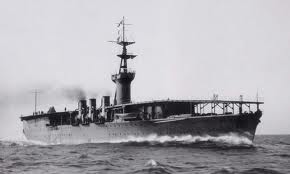
Hosho (Flying phoenix) was the first ship ever commissioned that was designed and built as an aircraft carrier and the first aircraft carrier of the Imperial Japanese Navy (IJN).[1] Commissioned in 1922, the ship was used for testing carrier aircraft operations equipment, techniques, such as take-offs and landings, and carrier aircraft operational methods and tactics. The ship provided valuable lessons and experience for the IJN in early carrier air operations. Hosho was modified several times during her career, including changes to her flight deck, superstructure, and armament.
Hosho and her aircraft group participated in the Shanghai Incident in 1932 and in the opening stages of the Sino-Japanese War in late 1937. During those two conflicts, the carrier's aircraft supported Imperial Japanese Army ground operations and engaged in aerial combat with enemy aircraft. The small size of the ship and her assigned airgroups (usually around 15 aircraft), however, limited the effectiveness of her contributions to combat operations. As a result, the carrier was placed in reserve after her return to Japan from China and she became a training carrier in 1939.
During World War II Hosho participated in the Battle of Midway in June 1942 in which her aircraft flew anti-submarine patrols and aerial reconnaissance missions. After the battle, the carrier resumed her training role in Japanese home waters for the duration of the conflict and survived the war with only minor damage from air attacks. She was used as a repatriation transport after the war and made nine trips bringing some 40,000 Japanese soldiers and civilians to Japan from overseas locations. Hosho was scrapped in Japan beginning in 1946.
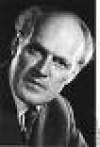
1923 Weimar: Willy Messerschmitt opens an aircraft manufacturing plant at Augsburg, Germany. Three years later he will produce his first all-metal plane.
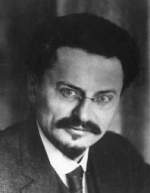
1927 USSR: Leon Trotsky is expelled from the Soviet Communist Party, marking a victory by Stalin in a power struggle.
1928 Various:
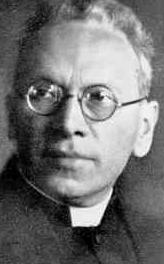
Weimar: Monsignor Ludwig Kaas, a German Catholic priest and former professor of canon law at Trier, is elected Chairman of the Catholic Center Party. (THP)
Harriman and Company becomes the chief organizer of a huge engineering program that will modernize Soviet heavy Industry. Harriman furnishes securities for all the Soviet purchases in the United States and collects generous commissions for his services. (THP)

Weimar: Henry Ford merges his German assets with those of I.G. Farben. (THP)

1929 Weimar: Heinrich Bruening, a financial expert supported by Monsignor Kaas, becomes leader of the Catholic Center Party, and its right-wing members assume control. (THP)
1932 USSR: Famine brings mounting opposition to Stalin within his own party. Brutally suppressing the peasant resistance, Stalin refuses to slacken the pace of his collectivization.
1934 Holocaust: The French Foreign Office refuses to issue transit visas for thousands of Jews fleeing Germany. (THP)
1936 Various:
Spanish Civil War: The Basque autonomous government, headquartered in Guernica, seizes a German vessel in Spanish waters. It will be released two days later.
Spanish Civil War: Britain and France agree on a mutual policy of nonintervention in the Spanish civil war.
1939 Various:

Today we are proud of having formulated our legal principles from the very beginning in such a way that they need not be changed in the case of war. For the maxim—that which serves the Nation is right, and that which harms it is wrong, which stood at the beginning of our legal work and which established this idea of the community, of the people as the only standard of the law—this maxim shines out also in the social order of these times.
World War II: The First Indian army troops join the British Expeditionary Force in France.
Holocaust: Poland: Mass execution by Germans of 170 men and boys at Wawer near Warsaw. (THP)
1940 World War II: Various:
Countdown to Infamy: The German raider Komet shells a phosphate plant on the island of Nauru in the central Pacific while flying a Japanese flag.
From official notes of the German naval war staff:
Naval Supreme Commander with the Fuehrer. Naval Supreme Commander emphasizes again that strict concentration of our entire war effort against England as our main enemy is the most urgent need of the hour. On the one hand, England has gained strength by the unfortunate Italian conduct of the war in the eastern Mediterranean and by the increasing American support. On the other hand, however; she can be hit mortally by a strangulation of her ocean traffic which is already taking effect. What is being done for submarine and naval air force construction is much too little. Our entire war potential must work for the conduct of the war against England; thus for the Navy and Air Force, every dispersion of strength prolongs the war and endangers the final success. Naval Supreme Commander voices serious objections against Russia campaign before the defeat of England.
1941 World War II: Various:
Phillipines: Japanese warplanes bomb Manila in the Philippines, even though it has been declared an 'open city.' Wave after wave of Japanese aircraft strike the city and continue throughout the following day.
USA: Office of Price Administration begins to ration automobile tires:
On this day in 1941, the federal Office of Price Administration initiates its first rationing program in support of the American effort in World War II: It mandates that from that day on, no driver will be permitted to own more than five automobile tires. [For further details, Click here.]
1942 World War II: Germans form the Smolensk Committee to enlist Soviet soldiers:

On this day, the German military begins enlisting Soviet POWs in the battle against Russia. General Andrei Vlasov, a captured Soviet war hero turned anticommunist, was made commander of the renegade Soviet troops.
Vlasov had been a military man since 1919, when, at age 19, he was drafted into the new "Red" Army to fight in the Russian Civil War. After joining the Communist Party in 1930, he became a Soviet military adviser to China's Chiang Kai-shek. Returning to Russia in 1939, Vlasov was given the 4th Armored Corps to command. He distinguished himself in the defense of Kiev and Moscow against the German invaders, even winning the Order of Lenin in 1941, and later the Order of the Red Banner as commanding general of the 20th Army.
Then came the defense of Leningrad in 1942. The Germans were overwhelming the Soviet forces at the front, and Stalin would not allow Vlasov to retreat to a more favorable position. His army was battered, and he was taken prisoner by the Germans along with many of his men. Back in Germany, Vlasov became disgusted with Stalin and communist ideology, which he had come to believe was a more sinister threat to the world than Nazism. He began broadcasting anti-Soviet propaganda and formed—with Nazi permission, of course—the Committee for the Liberation of the Peoples of Russia. Its goal: to overthrow Joseph Stalin and defeat communism.
The German "Smolensk Committee" began persuading more and more captured Russians, Ukrainians, Cossacks, and other Soviet anti-Stalinists to join the German war effort. These now-pro-German Soviets were finally formed into a 50,000-man army, the Russian Liberation division, and fought toward the end of the war, with Vlasov at their command. Tens of thousands ending up turning back against the Germans, then finally surrendering to the Americans—rather than the advancing Soviets—when the German cause was lost. The Americans, under secret terms of the Yalta Agreement signed in February, repatriated all captured Soviet soldiers-even against their will. Vlasov was among those returned to Stalin. He was hanged, along with his comrades in arms. (History.com)
1943 The Secret Diary of Anti-Hitler Conspirator Ulrich von Hassel: (Ebenhausen)
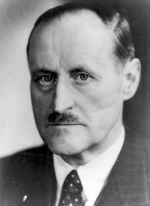
But more important than all this is the fact that in the week before Christmas, according to all assurances, there was, for the first time, a real prospect of reaching the goal. How often this has been claimed. My belief in the report was weak enough. But the assertion of serious people sounded so convincing that I really began to take the matter seriously. A few days before my departure, the setback came: "Postponed until January." Reason: "Because Hitler has taken off somewhere." In the decisive days, Pfaff (Goerdeler) was with me repeatedly and was in an understandable fury after the thing had been called off. The Josephs (the generals) would never make up their minds, but would first let things come to a full catastrophe. After a two day long wait in vain with Wuffi, I had a long satisfactory talk with Sophie's nephew on December 15, 1943, who again made a good impression on me, and who is very active.
1944 World War II: Various:

FDR seizes control of Montgomery Ward:
On this day in 1944, as World War II dragged on, President Franklin D. Roosevelt orders his secretary of war to seize properties belonging to the Montgomery Ward company because the company refused to comply with a labor agreement. [For further details, Click here.] France: The British XXX Corps drives the 2nd Panzer Division out of Celles.
Stalin to FDR:

[Radio] communications with Mikolajczyk's Government intercepted by us from terrorists arrested in Poland—underground agents of the Polish emigre Government (London Poles)—with all palpability prove that the negotiations of M. Mikolajczyk with the Polish National Committee served as a screen for those elements who conducted from behind Mikolajczyk's back criminal terrorist work against Soviet officers and soldiers on the territory of Poland . . . . It seems to me that now we should be interested in the support of the Polish National Committee and all those who want or are capable to work together with it, and that is especially important for the Allies and for the solution of our common task—the speeding of the defeat of Hitlerite Germany. For the Soviet Union, which is bearing the whole burden for the liberation of Poland from German occupationists, the question of relations with Poland under present conditions is the task of daily close and friendly relations with a power which has been established by the Polish people on its own soil and which has already grown strong and has its own army, which, together with the Red Army, is fighting against the Germans . . . . Poland is a border State with the Soviet Union and the problem of Poland is inseparable from the problem of security for the Soviet Union. To this I have to add that the successes of the Red Army in Poland in the fight against the Germans are to a great degree dependant on the presence of a peaceful and trustworthy rear in Poland. And the Polish National Committee fully takes into account this circumstance, while the emigre Government and its underground agents by their terrorist actions are creating a threat of civil war in the rear of the Red Army and counteract the successes of the latter . . . . I think that we cannot allow the Polish people to say that we are sacrificing the interests of Poland in favor of the interests of a handful of Polish emigrants in London.
Death: Not Sim Kessel:
Sim Kessel is hanged at Auschwitz. He was twenty-five years old and had been caught attempting to escape. Sim Kessel (called Sam in some accounts), a French Jew who boxed professionally, had been at Auschwitz for two years—a staggering period of time where the normal lifespan of a prisoner was at most three months—and had already escaped the gas chambers on two occasions. Click here for his amazing story
1978 Spanish king ratifies democratic constitution:

Following its approval in a national referendum, King Juan Carlos ratifies Spain's first democratic constitution in nearly five decades.
Juan Carlos' grandfather was Alfonso XIII, the last ruling monarch of Spain, who was forced into exile in 1931 after Spain was declared a republic. Born in Italy in 1938, Juan Carlos returned to Spain in 1955 under the invitation of General Francisco Franco, dictator of Spain since 1936. In 1969, Franco designated Juan Carlos his successor. In 1975, Juan Carlos became Spain's acting head of state after Franco conceded that he was too ill to govern. The 83-year-old dictator had been suffering serious health problems for nearly a year. Three weeks after Juan Carlos assumed power, Franco died of a heart attack. Two days later, on November 22, Juan Carlos was crowned king.
Despite having pledged loyalty to Franco's authoritarian regime, King Juan Carlos immediately began a transition to democracy in Spain. During the next decade, he presided over a period of extensive democratization in Spain. (History.com)
1979 Soviets take over in Afghanistan:
In an attempt to stabilize the turbulent political situation in Afghanistan, the Soviet Union sends 75,000 troops to enforce the installation of Babrak Karmal as the new leader of the nation. The new government and the imposing Soviet presence, however, had little success in putting down antigovernment rebels. Thus began nearly 10 years of an agonizing, destructive, and ultimately fruitless Soviet military intervention in Afghanistan. [For further information, click here]
Edited by Levi Bookin (Copy editor)
levi.bookin@gmail.com
FAIR USE NOTICE: This site may contain copyrighted material the use of which has not always been specifically authorized by the copyright owner. We are making such material available in our efforts to advance understanding of historical, political, human rights, economic, democracy, scientific, environmental, and social justice issues, etc. We believe this constitutes a 'fair use' of any such copyrighted material as provided for in section 107 of the US Copyright Law. In accordance with Title 17 U.S.C. Section 107, the material on this site is distributed without profit to those who have expressed a prior interest in receiving the included information for research and educational purposes. If you wish to use copyrighted material from this site for purposes of your own that go beyond 'fair use', you must obtain permission from the copyright owner.
Please note that the list-owner and the moderators are not responsible for, and do not necessarily approve of, the random ads placed on our pages by our web server. They are, unfortunately, the price one pays for a 'free' website.